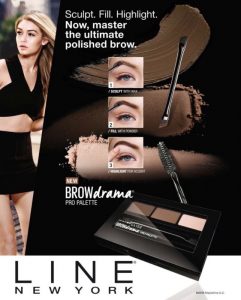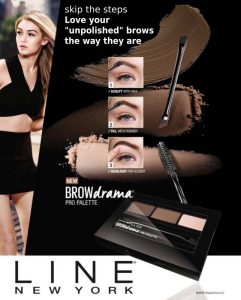
This Maybelline advertisement was published in 2015 with Gigi Hadid being the face of the brand. At a sudden glance this advertisement doesn’t seem to be controversial or questionable however once you dig deeper it holds an underlying meaning for women. The motive of this ad is to encourage women to buy the Maybelline eyebrow filling and shaping product in order to obtain flawless and polished eyebrows. In turn this is insinuating that without this product a woman’s natural eyebrows are dull and need to be fixed in order to look presentable. Deteriorating a woman natural state seems to be a common theme in makeup advertisements where they make women feel like their natural self is never good enough. The media does an exceptional job in deteriorating the already unstable foundation of a woman’s self esteem in the 21st century, and this advertisement is just one of many that demonstrate this. Due to the expectations and pressure from society for women to always look their best this has in turn caused self loathing and body shaming in women all around the world. When a woman looks at a makeup advertisement she shouldn’t feel like she needs to alter the way she looks in order to adhere to what the advertisement is asserting. Instead she should be given the confidence that it isn’t anything short of perfect to love your skin or your body the way it is, without putting any chemicals or pigments on it.

This is my new representation of the Maybelline eyebrow advertisement. This revised version of the advertisement has two different layers to it. The first is the alternation of the caption. This new and improved caption doesn’t pressure the consumer into buying the product merely because it will turn their eyebrows from untamed to polished and sculpted. Now it encourages women to stop wasting the time and effort into sculpting themselves to fit a certain societal standard which is only hurting them. By saying ‘love your “unpolished” brows the way they are,” it is insinuating that the women looking at this advertisement don’t need any sort of product to help “fix” their natural eyebrows. The second layer to this advertisement is the picture of the three step process of “fixing” the eyebrow. I kept this in the picture because with the change of the caption it now represents the negative shift of moving from a real eyebrow to a fake one. Whereas in the original image the steps show how you can master this talent of “the ultimate polished brow.” This statement is putting the eyebrow routine on a pedestal as something every woman should strive to master, which shouldn’t be the case. My new advertisement doesn’t pressure any woman into altering her appearance in order to fulfill the standards of society.
